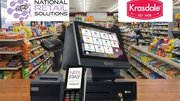Article
Commentary: Keeping kiosks relevant in a changing self-service landscape
Recent data point to changing consumer preferences, but it doesn't have to spell the end of kiosks as we know them.

October 8, 2009
Though a recent state-of-the-industry study from Summit Research Associates reports languishing global kiosk installations, Summit founder Francie Mendelsohn believes the industry will see growth again starting in 2010. So why not use this fresh beginning to go one step further and embrace the growing demand for digital delivery and mobile self-service?
We all know kiosk adoption isn't a matter of getting apprehensive users to understand the technology anymore. They've proven that they comprehend and even prefer self-service. But for consumers to remain confident that anything a clerk can do they can do better, solutions providers and application developers must expand their ideas about what self-service means and give users more — and different — options.
In her analysis of the DVD kiosk segment, Mendelsohn warns that the application will be eclipsed by the digital delivery of films in upcoming years. In other words, while DVD kiosk brands are either suing Hollywood studios or wheeling and dealing with them, shoppers are wondering when digital distribution will be a reality. Not a day goes by that I don't see a Tweet from a redbox customer asking when she'll be able to download the movies she wants to watch instead of traveling to a kiosk, waiting in line and hoping the disc is in stock.
According to Video Business, Sony Home Entertainment and Universal Studios both already offer video on-demand service in the home through cable pay-per-view provider iN Demand, and both studios are working with others in Hollywood to provide a Web-based VOD service soon. To get a piece of the pie, self-service providers must find a viable way to deliver films digitally to consumers as well.
MOD Systems has gotten a foot in the door on the digital download front with an upcoming pilot deployment of kiosks that allow users to download movies to an SD card, which they then plug into their televisions. While the MOD pilot is a step in the right direction for the industry, I would guess that a small percentage of consumers own TVs with SD card slots and built-in media players, potentially making the solution impractical on a large scale.
These kinds of ideas are a start, but self-service providers have to figure out a way to offer digital distribution of films in a manner that makes sense for users and comes naturally to the consumer experience. And that may mean we need to let the definition of self-service evolve beyond the kiosk to accommodate the experience the technologically discerning consumer has come to expect.
Also in the Summit report, Mendelsohn says airline self-service will continue to move toward offering mobile capabilities — some carriers in Canada and Asia already offer the technology, and one U.S. carrier is testing it.
According to recent data from SITA, a provider of communications and I.T. solutions for the air-transport industry, 44 percent of passengers indicated positive feelings toward mobile self-check-in, and 66 percent of self-service check-in users said they would prefer an electronic boarding pass over a paper version. So while airlines are trying to figure out what else they can charge a fee for, travelers are wondering when they'll finally be able to head straight for security with their boarding passes on their smart phones.
But the beauty is that, although savvy movie lovers and travelers may be clamoring for the next big thing in self-service technology, the movement won't cannibalize current kiosk offerings. Kiosk developers have hit on something special, and self-service as we know it now isn't going anywhere.
For instance, SITA's survey also found that at Atlanta's Hartsfield-Jackson Airport — which the company says is the world's busiest — a record 83.8 percent of passengers used self-service check-in. And, compared to the nearly half of travelers surveyed who said they felt positive about mobile check-in, an impressive two-thirds said the same about kiosk check-in.
Perhaps Dominique El Bez, SITA's director of portfolio marketing, said it best when I asked how kiosks are to stay relevant as technology and consumer demand change around them.
"It is not about doing the same thing from a different channel," he said. "It is about doing things differently. Kiosk providers have to adapt rapidly and must consider the kiosk as a component of a holistic self-service transformation."
Caroline Cooper is editor of KioskMarketplace.com and SelfServiceWorld.com. To submit a comment, please e-mail her atcarolinec@networldalliance.com.
 ChatGPT
ChatGPT Grok
Grok Perplexity
Perplexity Claude
Claude










